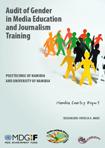|
|
 |
Setting things right towards gender equality and equity in Namibia
Through this window, the MDG Achievement Fund seeks to facilitate the achievement of MDG 3 and all other MDGs through interventions addressing three dimensions of gender equality and women’s empowerment; capabilities, access to resources and opportunities, and security.
|
UNESCO's contribution to Joint Programme Output 1.1: The rights of women and girls are protected nationally through enactment and enforcement of existing legislation:
Develop curriculum on gender sensitivity for the Media for UNAM and Polytechnic journalism students on gender, and HIV and AIDS;
Develop a toolkit for media institutions to reach existing media personnel with gender sensitivity information and direction;
Assess the status of community based media and produce a community media communication strategy and train community media to implement recommendations of the strategy.
|
News |
 |
|
|
|
13 Feb 2012 Workshop for staff and volunteers of Multi-purpose community centres, Windhoek 15 to 16 February 2012 UNESCO Office Windhoek
Kavango, Ohangwena, Omaheke, Karas, Caprivi, Omusati, Kunene Regions. Habitat Research and Resource Centre, 247 Claudius Kandovazu Street, Katutura, Windhoek - 15 to 16 February 2012 More |
|
 10 Oct 2011 Improving capacities of the youth and the Multipurpose Community Centers in Caprivi UNESCO Office Windhoek 10 Oct 2011 Improving capacities of the youth and the Multipurpose Community Centers in Caprivi UNESCO Office Windhoek
UNESCO organized a 3 day training on Media and Information Literacy and User Generated Content from 19-21 August in Sachona (Caprivi region, Namibia). Members of Ibbu and Sachona Multipurpose Community Centers (MPCCs) made inputs and comments on the Multipurpose Community Centers’ Manual drafted by UNESCO which aims at improving the social impact of the centers. More |
|
31 May 2010 Presentation on the Gender Toolkit for Educators Emily Brown (Polytechnic of Namibia)
Dr. Sarala Krishnamurthy, Dean of the School of Communication, requested that the Department Media Technology host the Lecture/Recital Series in the School of Communication on Friday, 28 May 2010. Her request was granted and, included in the Programme for the afternoon, was a presentation on the Gender Toolkit for Educators. Part of the programme was offered by a lecturer in the Department Media Technology, Ms Bertha Amakali, who focused a project aimed at creating awareness around gender-based violence. This summary, however, will be on the presentation on the Gender Toolkit for Educators. More |
|
 30 Apr 2010 World Press Freedom Day celebrated in Namibia, 7 May 2010 UNESCO Office in Windhoek 30 Apr 2010 World Press Freedom Day celebrated in Namibia, 7 May 2010 UNESCO Office in Windhoek
World Press Freedom Day is celebrated across the globe every May 3rd, representing an opportunity to commemorate the fundamental principles of press freedom. The theme for this year’s World Press Freedom Day is, “Freedom of Information: The Right to Know”, and will be celebrated in cooperation with the United Nations System, MISA Namibia, The Polytechnic of Namibia and Gender Links. The celebrations will take place at Hotel Thule on 7 May 2010, and will start at 3pm with an opening address by Ms Kari Egge, the Resident Coordinator of the United Nations in Namibia. More |
|
04 Feb 2010 Workshop on gender in media training to take place in Windhoek this week UNESCO Office in Windhoek
UNESCO’s Office in Windhoek in cooperation with Gender Links, a regional NGO based in Johannesburg, will be hosting a follow-up workshop to the Gender in Media Education Audit that assessed the situation in two institutions, the Polytechnic of Namibia and the University of Namibia. More |
Documents |
 |
|
|
|
Getting the balance right: gender equality in journalism International Federation of Journalists
This handbook is a timely, illustrated and easy-to-read guide and resource material for journalists. It evolved primarily out of a desire to equip all journalists with more information and understanding of gender issues in their work. It is addressed to media organisations, professional associations and journalists’ unions seeking to contribute to the goal of gender equality. More |
|
 Audit of Gender in Media Education and Journalism Training Namibia Patricia A. Made Audit of Gender in Media Education and Journalism Training Namibia Patricia A. Made
This report presents the findings of an audit on gender in media education and journalism training in the entry level and postgraduate media and journalism training programmes offered at the Polytechnic of Namibia (PON) and the University of Namibia (UNAM). The Namibian findings will feed into a larger audit of Gender in Media Education and Journalism Training institutions in 14 Southern African countries conducted in 2009 by Gender Links (GL), through the Gender and Media Diversity Centre (GMDC), a partnership between media development NGOs and knowledge institutions managed by Gender Links. More |
|
 |
 |
|

